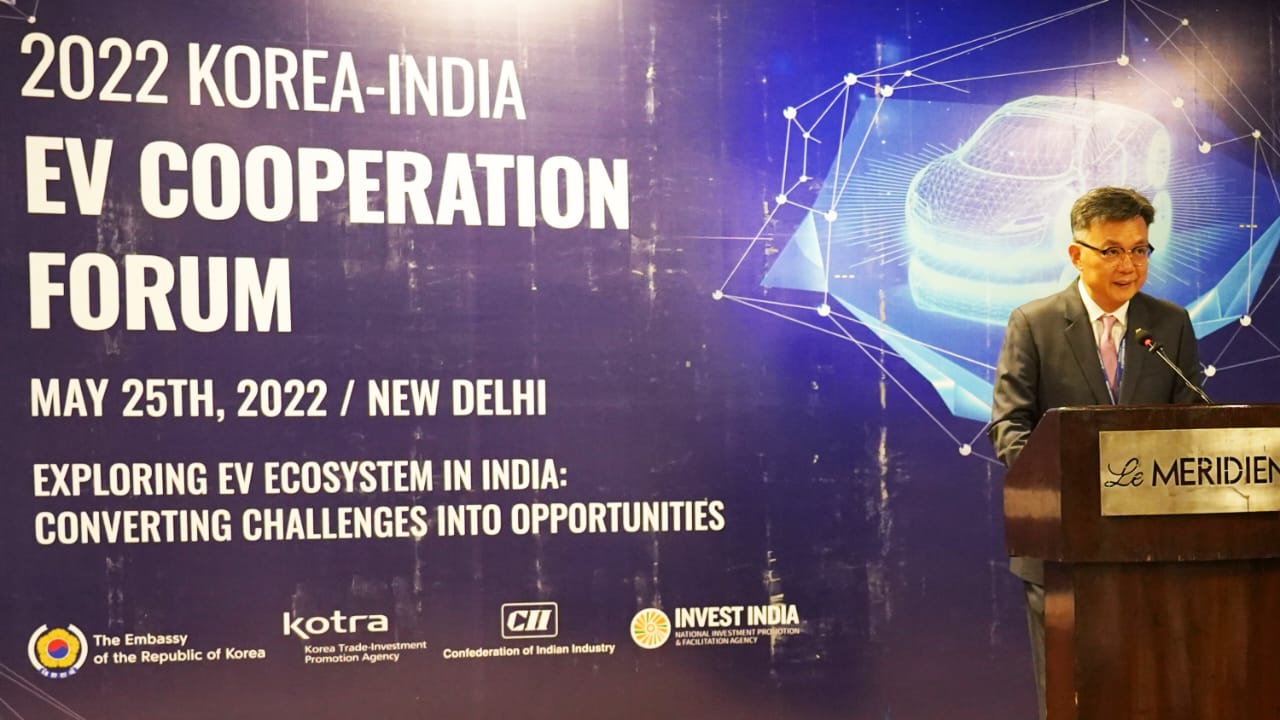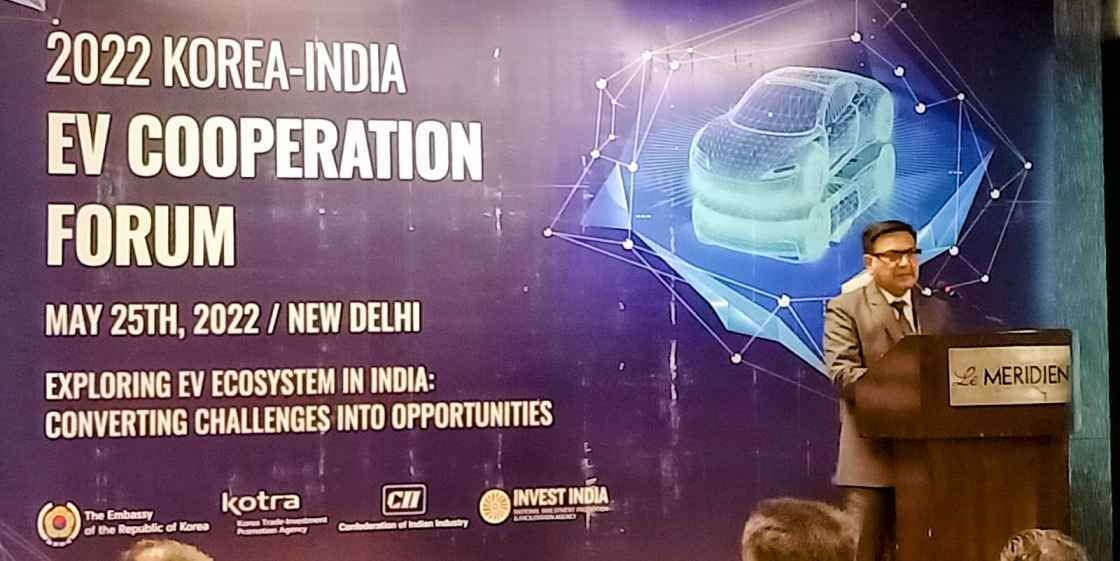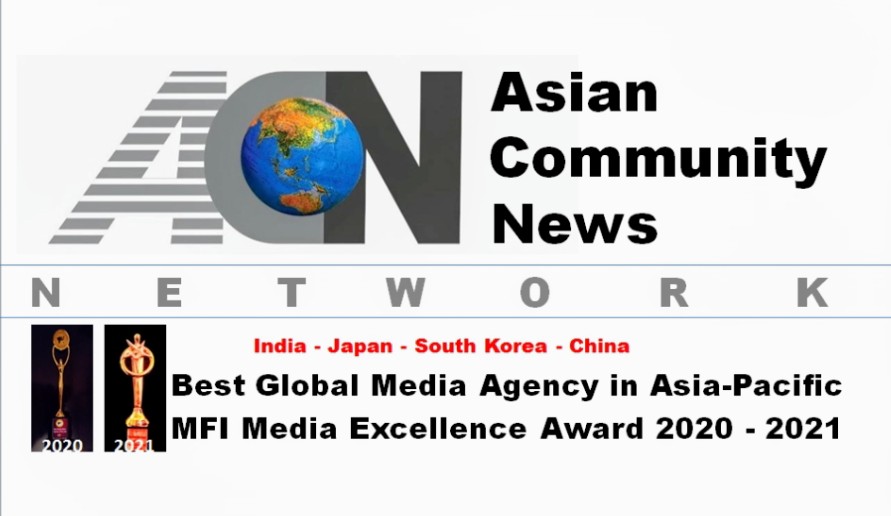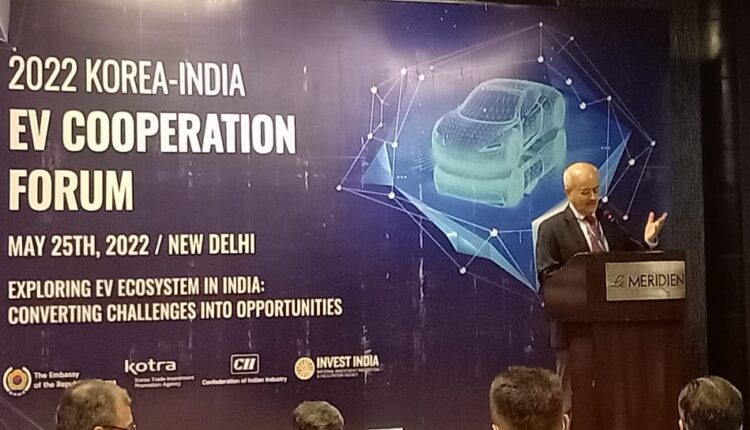Indian EV industry can leverage Korea’s matured battery, innovation-driven ecosystem: CII
World's 4th largest exporter of EVs, Korea can help India reduce mobility battery cost, which is about 40 percent of the electric vehicle
NEW DELHI. Vipin Sondhi, Chairman, CII National Committee on Future Mobility & Battery Storage said Wednesday that the Indian industry can leverage and partner with South Korea to develop the electrical vehicle (EV) market in India and through collaboration, it can emerge as leaders for a large part of the world.
South Korea’s matured battery and OEM ecosystem are driven by innovation, and India’s strong manufacturing ecosystem and its government’s focus on self-reliance, he added.
Mr. Sondhi was speaking at the Korea-India EV Cooperation Forum organised by Korea Trade-Investment Promotion Agency (KOTRA) – the state-run trade promotion arm of the Korean government, with the support of CII and invest India in New Delhi today.
“When it comes to batteries, CII has sought various measures to reduce the cost of mobility batteries. The cost is currently around 40 per cent of the vehicle cost. The suggestions include 2nd life use, vehicle registration without battery, indigenization of raw material for batteries, recycle and reuse. The market in batteries is yet to fully develop. It is here also that CII sees a need for alignment between the Indian and Korean companies,” he added.
Mr. Sodhi said that with CEPA (Comprehensive Economic Partnership Agreement) in place, India and South Korea were looking to grow bilateral trade. He said, “Automobile industry of both the countries can further technological tie-ups, while being partners in handling changes that have become essential because of sustainability challenges.”
The key objectives behind this seminar are to boost industrial cooperation between India and South Korea in the EV sector, discuss at length information on India’s current landscape and related policies, and iIdentify barriers to entry and challenges being faced by initial EV players along with investigating risk-mitigation strategies.
 The event was attended by Chang Jae-Bok Ambassador to India, the Embassy of the Republic of Korea, and top officials from Niti Ayog, Hyundai Motor India, Indian Institute of Technology (IIT)-New Delhi, Hero Motors, TATA Power, Magenta Power and Convergence Energy Services Limited (CESL).
The event was attended by Chang Jae-Bok Ambassador to India, the Embassy of the Republic of Korea, and top officials from Niti Ayog, Hyundai Motor India, Indian Institute of Technology (IIT)-New Delhi, Hero Motors, TATA Power, Magenta Power and Convergence Energy Services Limited (CESL).
In his speech, Chang Jae-Bok said that ever since the establishment of diplomatic relations in 1973, Korea and India always enjoyed cordial relation between the two countries developing their economic, cultural and political relation seamlessly.
Ambassador said, “Today’s Korea-India EV Cooperation Forum will greatly contribute to the economic cooperation between the two countries because the automobile industry is in the middle of a transition from internal combustion engines vehicle to electric vehicles and it means a lot when we discuss together over new, green form of automotive at this historical transition.”
Ambassador said that Korea is one of the global leaders in the EV industry. It is the 8th largest market in the world with 30,000 units sold annually and it exports more than 120,000 units per year. Hence, establishing itself as the fourth largest EV exporter in the world.
Dr. B.K Panigrahi, Head of Centre For Automotive Research & Tribology (CART) and Professor at IIT Delhi, also presented his valuable inputs highlighting the infrastructural challenges for EV segment in India and discussing solutions that bridge this gap.
“The faster adaptation of EV(s) in India is still encountering greater technical challenges such as charging infrastructure, cost, repair, etc. However, the major challenge is the skilling and re-skilling of the personnel associated with the transportation industry because of the transition from the IC engines to the EV(s)”, he said.
The audience had representatives from the expert Auto/EV Indian and Korean companies such as Motherson, Siemens, Minda Industries, TVS, Ola and others.

Puneet Anand, AVP & Group Head, Corporate Affairs, Hyundai Motor India made an elaborate presentation on the EV Roadmap and Strategy Going Forward in India’s perspective. He explained about the global vision the Hyundai Motor has, and how it’s directly connected with the progress of humanity worldwide.
Other speakers included Sudhendu J. Sinha, Advisor, NITI Aayog; Rahul Bhatnagar, Head- Business Development & Sales, Electric Vehicles & Emerging Mobility Business, Hero MotoCorp; Sandeep Bangia, Head-EV, TATA Power; Maxson Lewis, Managing Director, Magenta Power; and Mahua Acharya, CEO, Convergence Energy Services Limited (CESL).



